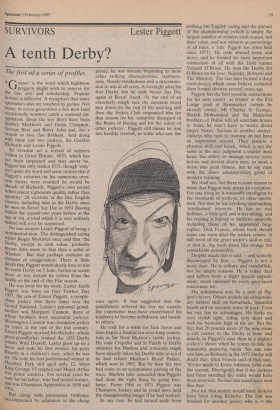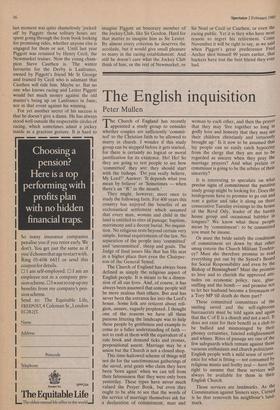SURVIVORS Lester Piggott
A tenth Derby?
The first of a series of profiles.
`G enius' is the word which highbrow
priggery might wish to reserve for the fine arts and scholarship. Popular instinct is different. It recognises that some Sportsmen also are touched by genius. Not many: in every generation a few men (and occasionally women) catch a national im- agination. Since the war there have been Stanley Matthews and Denis Compton, George Best and Barry John and, for a season or two, Ian Botham. And along With them just two jockeys, Sir Gordon Richards and Lester Piggott. Sir Gordon set a record of winners ridden in Great Britain, 4870, which has not been surpassed and may never be. Piggott has only ridden 4315, though 'only' isn't quite the word and some reckon that if hggott's victories on his numerous over- seas forays were counted he would be aheads of Richards. Piggott's own record achievement represents quality rather than quantity: 28 victories in the five English Classics, including nine in the Derby since he won on Never Say Die in 1954 (having ridden the second two years before at the age of 16), a total which it is very unlikely indeed will ever be surpassed. No one accuses Lester Piggott of being a sentimental man. The distinguished racing Writer Roger Mortimer once said that 'the Derby, except in cash value, probably Means little more to him than a seller at Windsor'. But that perhaps contains an element of exaggeration. There is little doubt that Piggott would dearly love to win his tenth Derby on 5 June, before as seems more or less certain he retires from the saddle at the end of this Flat season.
He was bred for his work. Lester Keith Piggott was born on Guy Fawkes Day 1935, the son of Ernest Piggott, a steeple- chase jockey who three times won the Grand National. Lester's paternal grand- mother was Margaret Cannon, three of whose brothers were successful jockeys: Mornington Cannon was champion jockey SIX times at the end of the last century. Ernest Piggott married Iris Rickaby, whose great-grandfather trained the 1855 Derby Winner Wild Dayrell. Lester grew up on a horse and rode his first winner, his pony Brandy in a children's race, when he was
_six. He rode his first professional winner at tlaydock Park still aged only 12, when
• King George VI reigned and Major Attlee Was prime minister. For several years he rode for his father, who had turned trainer, and was Champion Apprentice in 1950 and 1951.
But along with precocious brilliance (accompanied by adulation in the cheap press), he was already beginning to show other striking characteristics: stubborn- ness, bloody-mindedness and a determina- tion to win at all costs. A fortnight after his first Derby win he rode Never Say Die again at Royal Ascot. At the end of an extremely rough race the stewards stood him down for the rest of the meeting and then the Jockey Club suspended him for that season for his 'complete disregard of the Rules of Racing and for the safety of other jockeys'. Piggott still thinks he was too harshly treated, as some who saw the race agree. It was suggested that the punishment sobered the boy up; equally the experience may have exacerbated his tendency to become withdrawn and hostile to others.
He rode for a while for Jack Jarvis and then began a fruitful ten-year-long connec- tion as Sir Noel Murless's stable jockey. He rode Crepello and St Paddy in Derby victories for Murless and ironically might have already taken his Derby tally to ten if he had ridden Murless's Royal Palace, which won in 1967. But by then the two had come to an acrimonious parting of the ways. Murless later conceded that Piggott had done the right thing by going free- lance. From 1964 to 1971 Piggott was Champion Jockey and he could have held the championship longer if he had wanted.
In any case, he had turned aside from nothing but English racing and the pursuit of the championship (which is simply the largest number of winners each season, not their value, and not winners as percentage of all rides, a 'title' Piggott has often held since 1971). He rode abroad more and more; and he formed his most important connection of all with the Irish trainer Vincent O'Brien. He won the Derby for O'Brien on Sir Ivor, Nijinsky, Roberto and The Minstrel. The two men formed a deep confederacy which some believe outlasted their formal divorce several years ago.
Piggott has the best possible connections for his next career, as trainer at the Eve Lodge yard at Newmarket (which he already owns): Mr Charles St George, Sheikh Mohammed and the Maktoum brothers of Dubai will all send him horses to train; he won't have to worry about empty boxes. Success is another matter. Jockeys who turn to training do not have an impressive record. They possess a physical skill and knack, which is not the same as the nice judgment a trainer must have, the ability to manage several score horses and several dozen men, to work a horse into peak fitness, not to say cope with the sheer administrative grind of modern training.
We shall see, but there is some reason to think that Piggott may prove an exception. For one thing he is unusually intelligent by the standards of jockeys, or other sports- men. Not that he has anything approaching 'intellectual' interests. He has no real hobbies, a little golf and water-skiing, and his reading is limited to thrillers, naturally including those of his appointed biog- rapher, Dick Francis, whose book should come out soon after the jockey retires. It will need all the great writer's skill to tell, or hint at, the truth about this strange but remarkable personality.
Despite much that is said — and scarcely discouraged by him — Piggott is not a nasty man. He is solitary and standoffish, but for simple reasons. He is rather deaf and suffers from a slight speech impedi- ment, much imitated by every grey-faced racecourse wit.
His solitariness may be a part of Pig- gott's secret. Others include his extraordin- ary natural skill on horseback, beautiful hands and an uncanny sense of pace. Even his size has its advantages. He looks no very stylish sight, riding very short and with his backside high in the air. But the fact that 20 pounds more of the nine stone a colt carries in the Derby is bone and muscle in Piggott's case than in a slighter jockey's shows when he comes to ride his inimitably powerful finish. No one who saw him on Roberto in the 1972 Derby will doubt that. Dick Francis said of that race, 'It's no insult to Ernie Johnson [who rode the second, Rheingold] that if the jockeys had been switched the order would have been reversed. No one else could have won like that.'
Nor for that matter would most jockeys have been riding Roberto. The colt was booked for another jockey who n. r the
last moment was quite shamelessly `jocked off' by Piggott: those solitary hours are spent going through the form book looking for promising rides, whether anyone else is engaged for them or not. Until last year Piggott was retained by Henry Cecil, the Newmarket trainer. Now the young cham- pion Steve Cauthen is. The winter favourite for the Derby is Lanfranco, owned by Piggott's friend Mr St George and trained by Cecil who is adamant that Cauthen will ride him. Maybe so. But no one who knows racing and Lester Piggott would bet much money against the old master's being up on Lanfranco in June; nor in that event against his winning. • For yet another secret of his success is that he doesn't give a damn. He has always stood well outside the respectable circles of racing, which sometimes admit a jockey inside as a gracious gesture. It is hard to imagine Piggott an honorary member of the Jockey Club, like Sir Gordon. Hard for that matter to imagine him as Sir Lester. By almost every criterion he deserves the accolade, but it would give small pleasure to many in the racing establishment. And still he doesn't care what the Jockey Club think of him, or the rest of Newmarket, or Sir Noel or Cecil or Cauthen, or even the racing public. Yet it is they who have most reason to regret his retirement. Come November it will be right to say, as we said when Piggott's great predecessor Fred Archer shot himself 99 years earlier, that backers have lost the best friend they ever had.











































 Previous page
Previous page